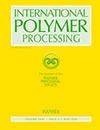Time series data for process monitoring in injection molding: a quantitative study of the benefits of a high sampling rate
IF 1.1
4区 工程技术
Q4 ENGINEERING, CHEMICAL
引用次数: 0
Abstract
Abstract Process monitoring systems are playing an increasingly important role in reducing production capacity losses in injection molding. Process monitoring and optimization systems are mostly based on processing data of injection molding machine control systems. These data consist of scalar data and time series. This paper introduces a novel approach to modelling injection molding processes using only time series data and evaluates the quantitative influences of varying sampling times on calculation of integral values and model quality. On the basis of the first experiment, it is shown that the sampling rates of these time series have a large influence on information which can be derived from this data (e.g. injection work). These findings provide an assessment of whether the effort is justified for the respective requirements on the accuracy of the injection work and other parameters derived from the time series. In the second experiment, a model is presented which uses only the injection flow and injection pressure profile as input and achieves high coefficients of determination for the prediction of the part weight, despite the absence of mold sensor data and scalar data. It is shown that higher sampling rates of time series results in higher prediction quality of these models. This improves the understanding of the data needed for high quality machine learning models of injection molding processes and enable users to estimate a lower bound for the sample rates of time series for their use cases.注塑过程监控的时间序列数据:高采样率效益的定量研究
摘要过程监控系统在减少注塑生产能力损失方面发挥着越来越重要的作用。工艺监控和优化系统大多基于注塑机控制系统的工艺数据。这些数据由标量数据和时间序列组成。本文介绍了一种仅使用时间序列数据对注塑过程建模的新方法,并评估了不同采样时间对积分值计算和模型质量的定量影响。在第一个实验的基础上,研究表明,这些时间序列的采样率对可以从这些数据中得出的信息(例如,注入功)有很大影响。这些发现提供了一个评估,即对于注射工作的准确性和从时间序列得出的其他参数的相应要求,该努力是否合理。在第二个实验中,提出了一个模型,该模型仅使用注射流量和注射压力轮廓作为输入,并且在没有模具传感器数据和标量数据的情况下,实现了用于预测零件重量的高确定系数。结果表明,时间序列的采样率越高,这些模型的预测质量就越高。这提高了对注塑工艺的高质量机器学习模型所需数据的理解,并使用户能够估计其用例的时间序列采样率的下限。
本文章由计算机程序翻译,如有差异,请以英文原文为准。
求助全文
约1分钟内获得全文
求助全文
来源期刊

International Polymer Processing
工程技术-高分子科学
CiteScore
2.20
自引率
7.70%
发文量
62
审稿时长
6 months
期刊介绍:
International Polymer Processing offers original research contributions, invited review papers and recent technological developments in processing thermoplastics, thermosets, elastomers and fibers as well as polymer reaction engineering. For more than 25 years International Polymer Processing, the journal of the Polymer Processing Society, provides strictly peer-reviewed, high-quality articles and rapid communications from the leading experts around the world.
 求助内容:
求助内容: 应助结果提醒方式:
应助结果提醒方式:


